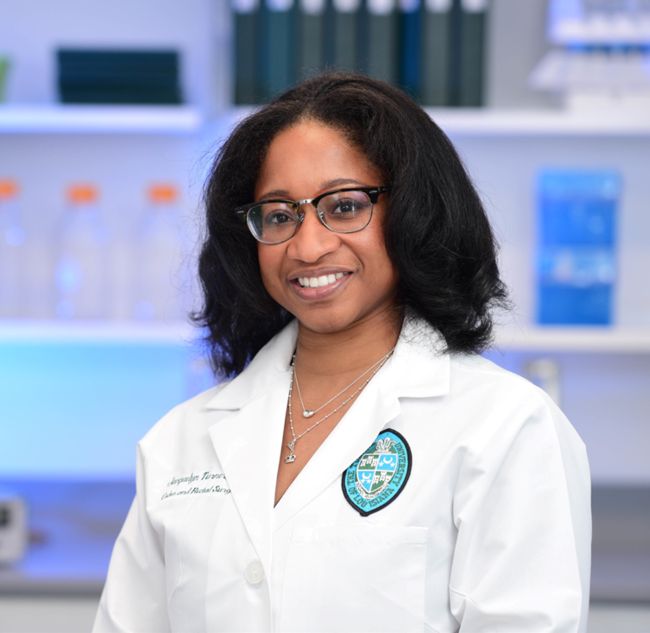Dr Kendra Outler recently spoke with Medical Doctor Jacquelyn Seymour Turner, Professor of Surgery at Tulane University School of Medicine, on the What the Doctor Say with Dr K podcast. In this episode, it touches on the shortfall of Black physicians in the profession. This is the second half of a two-part series with Dr Turner, who also holds the positions of Vice Chair of Surgical Education as well as Section Chief, Colon and Rectal Surgery at Tulane.
 Dr Jacqueline TurnerDuring the second half of their two-part episode, Drs. Outler and Turner discussed how to successfully navigate the medical profession, how more African-American students can be encouraged to become physicians, the importance of mentorship, and what it means to be a colorectal surgeon.
Dr Jacqueline TurnerDuring the second half of their two-part episode, Drs. Outler and Turner discussed how to successfully navigate the medical profession, how more African-American students can be encouraged to become physicians, the importance of mentorship, and what it means to be a colorectal surgeon.
Listen to Part 1
Dr Turner’s current position
As Vice Chair of Surgical Education at Tulane University School of Medicine, Dr Turner oversees the continuing education in the school’s Department of Surgeries. Of Dr Turner’s many responsibilities, she works with junior faculty members who have recently completed their surgical residency, and helps them learn how to teach the next class of future surgeons.
One of Dr Turner’s big responsibilities is helping to increase the number of minorities in the medical field. Currently, African-Americans make up approximately 12% of the population, but only five percent of the physician workforce. Dr Turner is helping to remedy that by reaching out to high school and college students, as she believes early encouragement of students to go into medicine is key.
“That’s a discrepancy,” Dr Turner said. “It should be pretty similar to the population (number). In order to make up for that, we need to reach back to our high schools, as young as we can go, and tell them, ‘Hey, you can be a doctor. You can do this,’ and give them the resources, help them with their study and test prep.”
The importance of good mentorship
Getting more African-American students into the medical field is just one piece of the puzzle.. The next step is ensuring they stay and succeed in the profession. Both DrK and Dr Turner noted that having good mentors can go a long way towards a successful medical career. DrK recalled how one of her earliest mentors not only provided encouragement, but also showed her how to be an all-around professional.
“Dr Lord mentored me, nurtured me, and encouraged me to be the best that I could be,” DrK said. “Some of that wasn’t just about being a doctor: some of it was, ‘Where’s your white coat? Are you on time? Stand straight. Walk faster. Don’t look at my patients like they’re getting on your nerves.’ It was all about professional development.”
Dr Turner, on the other hand, acknowledged she didn’t have mentors in medical school or during the first three years of her residency. It wasn’t until a physician asked her which medical societies she was a member of that she realized she didn’t have a mentor.
“I didn’t even know about the American College of Surgeons,” Dr Turner said. “That’s something I should have found out about back in medical school. Dr Richter sat me down and said, ‘These are those different societies you need to be in.’ That was my first inkling of a mentor. I also had other great people since then that took me on and started to help me.”
Dr Turner and DrK covered two other key aspects of mentorship. First was to find mentors early; don’t wait until you’re in trouble to find them. Second, find multiple mentors as they can help young physicians with different things.
“I tell my mentees today that I don’t want to be their only mentor,” Dr Turner said. “I might be good at telling you about one thing, but there are other people that can help you along and tell you about other aspects. And it just makes you a better, stronger person in the end.”
Be well-rounded
During the discussion, DrK noted that when encouraging young Black students to enter the medical field, she wants them to know there’s more than just research to focus on. DrK suggests students volunteer more, find non-science-based activities to take part in, and read books unrelated to work.
“Show me that you have compassion and ability to deal with different people other than in your ecosystems and you will grow from that interaction,” DrK said.
Dr Turner shared that sentiment and noted a time when she was encouraged to have students research outcomes in the community.
“(Doing that type of research) is two-fold,” Dr Turner said. “It gives us more insight and puts numbers on what’s happening in our community. But what it also does is, it allows us to have access and get in touch with the community.”
Click here to listen to Dr Turner and DrK’s conversation.